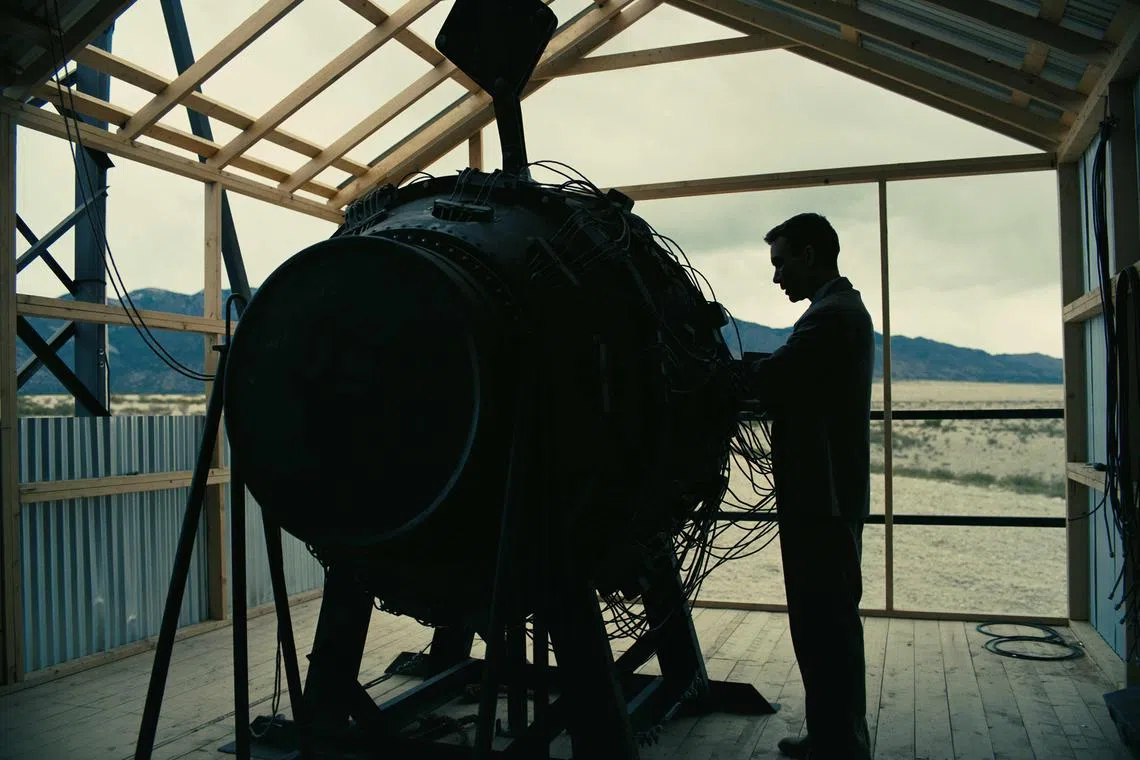At The Movies: Oppenheimer a flawed but bold attempt at making a scientist a tragic hero
Sign up now: Get ST's newsletters delivered to your inbox

Cillian Murphy is J. Robert Oppenheimer in Oppenheimer, the portrait of the scientist who helped create the atomic bomb.
PHOTO: UIP
Follow topic:
Oppenheimer (M18)
180 minutes, opens on Thursday
3 stars
The story: This portrait of the man known as the father of the atomic bomb, American physicist J. Robert Oppenheimer (Cillian Murphy), puts a spotlight on his time as the World War II director of the Los Alamos Laboratory, heading a scientific team trying to build the weapon ahead of the Germans. His relationships with Jean Tatlock (Florence Pugh) and Katherine “Kitty” Puening (Emily Blunt) are shown, along with his interactions with friends and colleagues in science and government, such as businessman and bureaucrat Lewis Strauss (Robert Downey Jr). Adapted from the 2005 biography American Prometheus: The Triumph And Tragedy Of J. Robert Oppenheimer, written by Kai Bird and Martin J. Sherwin.
Christopher Nolan’s films have always featured heroes whose neurons fire faster than everyone else’s.
Jessica Chastain’s Murphy Cooper had to solve a mathematics equation to take humanity off a doomed Earth in Interstellar (2014). In Inception (2010), Dom (Leonardo DiCaprio) commands the respect of the dream heist team because he keeps proving to be the smartest guy in the room.
Being smart, however, has not made fictional geniuses Murphy or Dom happy; they are isolated people.
In the American Prometheus book, Nolan found a hyperintelligent main character with a real supermind who has to, as Blunt puts it in an interview, “live with the trauma of that brain”.
The “tragedy” in the book’s title gives a clue about the price he pays for being able to see inside the atom, but failing to read the motives of those who feel threatened by his cognitive prowess.
Nolan likes to play with the format of storytelling as much as he likes telling the story, so this film features a non-linear chronological structure, in addition to techniques such as giving speaking parts to a platoon of scientists, leading to a bottom-numbing three-hour runtime.
This reviewer wishes that he could call Oppenheimer a triumph because Nolan’s technical innovations deserve recognition. But the non-linear timeline appears to be an attempt at creating psychological depth and tonal unity out of a creation that covers too much ground.

Cillian Murphy is J. Robert Oppenheimer in Oppenheimer, the portrait of the scientist who helped create the atomic bomb.
PHOTO: UIP
In the 180 minutes can be found a lengthy courtroom drama, a doomed romance between troubled leftist academics and a celebratory account of the Manhattan Project.
Nolan loves his temporal shifts – see his crime thriller Memento (2000) and the action thriller Tenet (2020) – but, here, the effect is not so much dazzling as it is dizzying.
That said, this work is still worth a watch because of the strong performances given by Downey Jr, Pugh, Blunt and, most of all, the serene yet alert Murphy, an actor who was born to play a man with a lot going on in his head.
Hot take: At times sprawling and undisciplined, and at others, inspired, this is one of those films that one would watch once, but probably never again – unless it was in the form of online clips of individual moments and performances.


